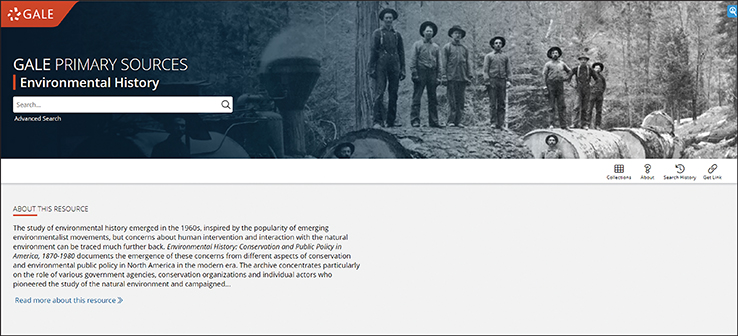Environmental History: Conservation and Public Policy in America, 1870–1980 | eReview
This Gale database offers a distinctive look into the history of American environmental conservation.
Environmental History: Conservation and Public Policy in America,
1870–1980
CONTENT One of the latest additions to the Gale family of primary source collections, Environmental History documents conservation efforts in the United States from the late 19th century through the 1980s. This collection details the work of American conservation pioneers alongside archival records and documents from government agencies, such as the Bureau of Land Management and the Bureau of Reclamation. These materials highlight the work of individual conservationists, advocacy groups, and government, which led to conservation efforts including the introduction of legislation and policies to protect national parks, forests, and other environmental landmarks. The collection is described as the first in a series that will explore environmental history and conservation worldwide.
The archive comprises 10 collections, with materials drawn from the Denver Public Library, the Institute of Government Studies (UC Berkeley), the New York City Bar Association Library, Yale University, and more. Researchers will find primary-source documentation on topics such as natural history, wildlife preservation, the birth of forestry and environmental management and preservation, the American West, Indigenous peoples, waterways, dams, and irrigation, the protection of wild horses, pollution, the development and protection of national parks, and a variety of environmental issues that remain relevant today.
USABILITY Basic and advanced search options make it easy for users to search the archive using keywords, document titles, subjects, or author/creator or to search the entire body of available documents. Other options allow for searching via manuscript number or Gale document number. Advanced search permits variations in spelling, along with a variety of limiters and filters. These include the option to limit by date range, include documents with no publication date, and search by collection title, document type, source library, illustrated works, language, topic, state/province, and/or country. The topic filter is particularly useful for researchers who may be less familiar with environmental conservation and serves as a good entry through which to browse the available documents.
Users can also explore the works by collection and filter by content, document type, language, or source library. Beyond this, users can also search within documents; download, save, and print their findings; access citations or export to their preferred citation manager; and access permalinks to an individual document or specific pages within a document. There are also a topic finder and term frequency tool, as well as the option to cross- section Gale Primary Sources available at the user’s institution.
PRICING The resource starts at $6,360, with a hosting fee that starts at $60 annually. Public library pricing is based on population served. Academic library pricing is based on an institution’s full-time enrollment and other variables. Institutions holding two or more Gale Primary Source collections receive complimentary access to Gale’s Primary Sources cross-search platform. For a free trial, visit gale.com//c/environmental-history-conservation-and-public-policy-in-america.
VERDICT Environmental History: Conservation and Public Policy in America, 1870–1980 provides a unique look at the history of American environmental conservation and serves as a resource for research on issues that remain relevant in today’s political and environmental landscape. Gale’s primary-source collections are consistently easy to use, and the various tools for searching and browsing allow even novice researchers to engage with archival works. A solid addition for institutions that support research in American history, environmental history, political science, public policy, conservation, land rights, and more.
RELATED
ALREADY A SUBSCRIBER? LOG IN
We are currently offering this content for free. Sign up now to activate your personal profile, where you can save articles for future viewing










Add Comment :-
Comment Policy:
Comment should not be empty !!!